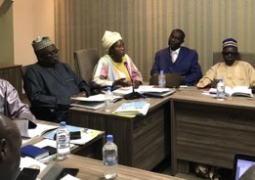Governor Lamin Saidykhan made this revelation during the opening ceremony of a three day sensitisation outreach programme of vulnerable communities targeting local Village Development Committees (VDCs), Community Based Organization (CBOs), Women and youth organisations within the NBR on the impacts of climate change on grassroots recently held in Albreda, NBR. The programme was funded by the Global Climate Change Alliance project (GCCA+) of the European Union (EU) and implemented by the National Environment Agency (NEA).
According to him, the objective of that local conclave was to sensitise coastal communities and engage their active participation in the sustainable management of our shared natural resources against climate change-induced risks and impacts.
As more than 60 percent of the country’s population live within the Gambia’s coastal and marine zone, he revealed that our coastline is likely to undergo the most profound change in the near future if positive intervention strategies are not put in place. Consequently, unless careful environmental management and planning are instituted, severe conflicts over coastal space and resource utilisation are more likely; and the degradation of natural resources will hinder development options.
“Coastal zones the world over have historically been among the most heavily exploited areas because of their rich natural resources. Correspondingly, there is also a sharp conflict between the need for utilization of coastal resources and the need to conserve the resource to ensure sustainable supply of those resources for future generations”. NBR Governor posited.
In many countries including The Gambia this conflict has already reached a critical stage; with large parts of the coastal zone polluted from land based sources, fish stock declining, wetlands drained or encroached, beaches eroded, arable agricultural land silted or affected by salinity and infrastructure threatened or ruined. If these coastal resources are to be maintained and or restored, effective action is urgently needed NOW.
In order to address these concerns, an Integrated Coastal Zone Management (ICZM) has been devised. ICZM is a governance system that puts in place the legal and institutional framework necessary to ensure that development and management plans for coastal zones are integrated with environmental, social and economic goals and are developed with the full engagement and participation of those affected. The purpose of ICZM is to maximize the benefits provided by the coastal zone and to minimise conflicts and harmful effects of activities upon each other, on resources and on the environment. It further seeks to guide government decision making on the equitable allocation and sustainable use of natural resources.
According to him the The Gambia government recognises the continued partnership and support by the GCCA+ project through The Gambia-EU Cooperation to enable us institutionalise ICZM programme for the country.
The Project Coordinator Aruna Jobe, said the outreach programme geared towards sensitisation on grass roots climate change impacts on our environment and livelihood. This, he said demonstrates the good partnership that exists between the government of The Gambia and the European Union in this crucial crusade against climate change and its impacts on people’s lives and livelihoods. Buttressing, he further revealed that climate change is the biggest challenge to our development efforts.
NEA`s programme manager for Coastal and Marine Environment Lamin Komma further called on the participants to actively help in the dissemination of whatever knowledge gathered to the people they represent and ensure proper implementation of the workshop recommendations.
Read Other Articles In Headlines
IMF reveals latest growth projections for Sub-Saharan Africa
Apr 16, 2021, 11:24 AM




